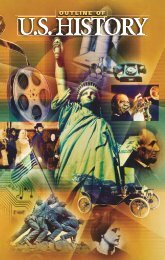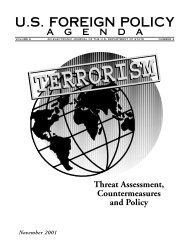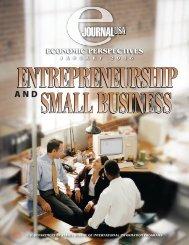Working for Women Worldwide - Embassy of the United States
Working for Women Worldwide - Embassy of the United States
Working for Women Worldwide - Embassy of the United States
You also want an ePaper? Increase the reach of your titles
YUMPU automatically turns print PDFs into web optimized ePapers that Google loves.
with its ministry <strong>of</strong> education to design and implement<br />
a new primary school curriculum focusing on active<br />
learning and relying less on rote memorization <strong>of</strong> facts.<br />
This curriculum is now being implemented nationwide.<br />
Community and government sensitization to <strong>the</strong><br />
importance <strong>of</strong> girls’ education helped increase <strong>the</strong>ir<br />
gross school enrollment numbers.<br />
Fur<strong>the</strong>r north in <strong>the</strong> Sahel region, USAID supports<br />
<strong>the</strong> government <strong>of</strong> Mali’s goal <strong>of</strong> <strong>of</strong>fering all<br />
children universal access to primary education by <strong>the</strong><br />
year 2015. At present, only 44 percent <strong>of</strong> girls in that<br />
country are in school, and women constitute just 20<br />
percent <strong>of</strong> <strong>the</strong> teaching corps. Among <strong>the</strong> educational<br />
projects <strong>the</strong> <strong>United</strong> <strong>States</strong> funds in Mali is one<br />
addressing girls’ specific learning needs, including<br />
making school environments<br />
more amenable to<br />
<strong>the</strong> demands on girls’ time<br />
(supporting community<br />
schools that are located<br />
closer to <strong>the</strong>ir homes<br />
with more flexible school<br />
schedules, <strong>for</strong> example)<br />
and ensuring that <strong>the</strong><br />
curriculum is gender sensitive.<br />
Angola, in southwest<br />
Africa, <strong>of</strong>fers a case<br />
study <strong>of</strong> <strong>the</strong> daunting<br />
developmental challenges<br />
many African countries confront, as well as <strong>the</strong> incremental,<br />
grass-roots improvements that U.S. <strong>for</strong>eign<br />
assistance supports.<br />
Gaining independence in 1975 after 400 years <strong>of</strong><br />
Portuguese colonial rule, Angola endured a quartercentury<br />
<strong>of</strong> nearly continuous warfare between <strong>the</strong> two<br />
major political factions. Although Angola is rich in<br />
natural resources, such as oil, diamonds, and fisheries,<br />
<strong>the</strong> conflict left <strong>the</strong> country’s economy in shambles and<br />
as many as 1.5 million dead. Social indicators, including<br />
infant mortality and life expectancy, are among <strong>the</strong><br />
worst in <strong>the</strong> world, and <strong>the</strong> country faces a challenge in<br />
educating <strong>the</strong> population to avoid <strong>the</strong> spread <strong>of</strong><br />
HIV/AIDS.<br />
Literacy rates in Angola also are low, with only 42<br />
percent <strong>of</strong> <strong>the</strong> population aged 15 or older able to read.<br />
The statistics <strong>for</strong> Angolan women are even worse:<br />
Only 28 percent can read and write.<br />
As part <strong>of</strong> <strong>the</strong> U.S. government’s <strong>for</strong>eign assistance<br />
program in Angola, a USAID-funded women’s<br />
center has helped provide basic literacy skills to<br />
women who o<strong>the</strong>rwise have no access to <strong>for</strong>mal education.<br />
Created as much to help streng<strong>the</strong>n <strong>the</strong> development<br />
<strong>of</strong> civil society and <strong>the</strong> understanding <strong>of</strong> human<br />
rights as to improve literacy, <strong>the</strong> center provides a<br />
clean, com<strong>for</strong>table learning environment <strong>for</strong> volunteer<br />
teachers and <strong>the</strong>ir students.<br />
Inaugurated in July 2003, <strong>the</strong> center currently<br />
enrolls 1,200 women, with an eventual capacity twice<br />
that size. To date, more than 1,500 Angolan women<br />
have received basic literacy training <strong>the</strong>re. The center<br />
plans to supplement <strong>the</strong>se literacy classes with training<br />
in small-business management—an important<br />
feature, given that most <strong>of</strong><br />
<strong>the</strong>se women earn <strong>the</strong>ir<br />
livelihood working as<br />
street vendors or operating<br />
microbusinesses.<br />
The Angolan Ministry<br />
<strong>of</strong> Education has<br />
committed itself to providing<br />
additional teachers,<br />
books, and educational<br />
materials <strong>for</strong> this<br />
women’s center. It has<br />
also cited <strong>the</strong> institution<br />
as an excellent example <strong>of</strong><br />
<strong>the</strong> initiatives needed to<br />
foster literacy as well as <strong>the</strong> values <strong>of</strong> civil society, both<br />
<strong>of</strong> which, in turn, help underpin Angola’s economic<br />
and political development.<br />
Investing in girls’ education does, in fact, confer<br />
significant economic and social returns on developing<br />
nations in Africa and elsewhere. Studies show that<br />
girls who complete even primary education become<br />
adults who are healthier and more economically productive<br />
and politically active; and <strong>the</strong>y raise children<br />
who stay in school longer.<br />
For more in<strong>for</strong>mation on this U.S. initiative, see:<br />
http://www.state.gov/p/af/ and http://www.usaid.gov/<br />
locations/sub-saharan_africa/.<br />
Z<br />
Above, women are <strong>the</strong> majority <strong>of</strong> students in <strong>the</strong> adult literacy<br />
programs funded by USAID throughout Angola.<br />
15












